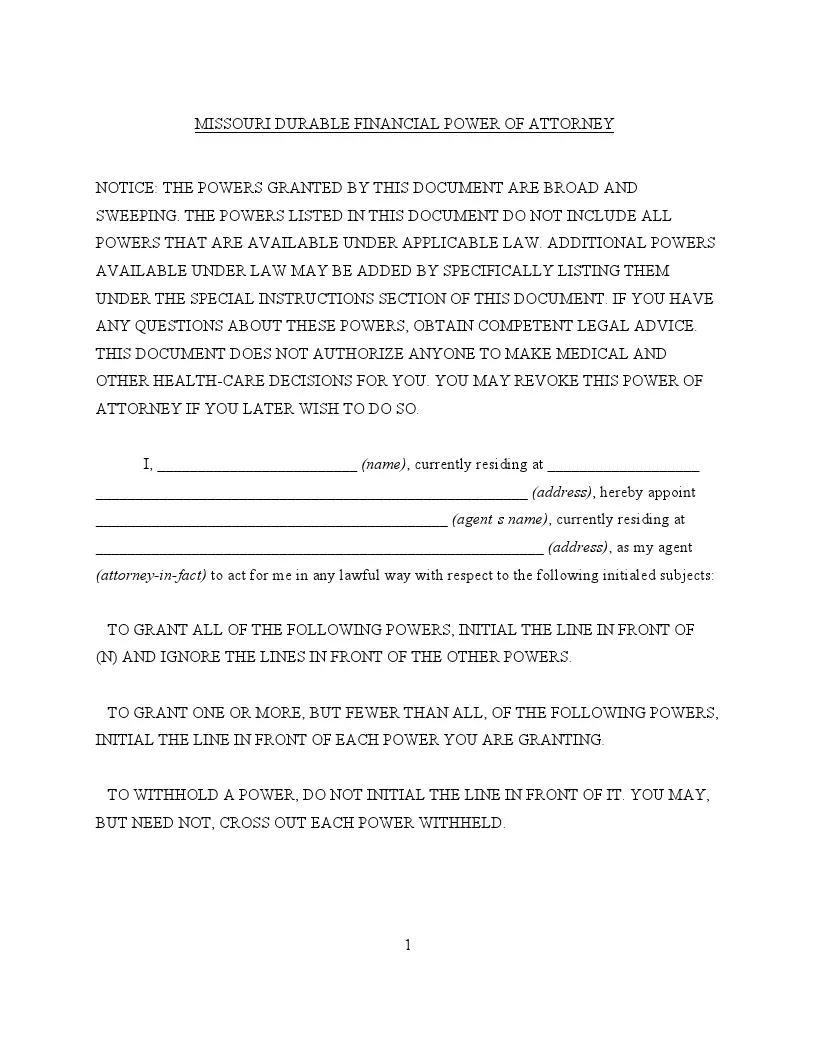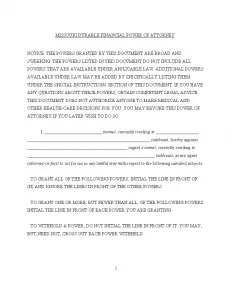Free Missouri Durable Power of Attorney Form
A “Durable Power of Attorney” (or DPA) is a form that is used in the US to give power to the designated agent or attorney who will be capable of financial matters in special cases. Among those cases is the disability of a person (or principal) that happens in a situation of a serious illness or accident.
Generally, the durable power of attorney form lets a principal feel confident in a question of his or her finances if something unplanned occurs. It is called a “durable” form because it lasts until the principal’s death or revoking.
However, it is important to say that the DPA form is signed only for the agent or attorney that will deal with financing. Prescriptions for severe physical conditions and needed medical care should be stated in another type of power of attorney form.
Missouri power of attorney forms – click for more Missouri-related power of attorney documents that you might need.

Build Your Document
Answer a few simple questions to make your document in minutes
Save and Print
Save progress and finish on any device, download and print anytime
Sign and Use
Your valid, lawyer-approved document is ready
To obtain a DPA, a person has to choose someone who will represent him or her if an accident or a disease occurs. This should be an agent (a hired professional) or the closest person from your family who you trust. If you want to appoint your family member as an attorney, you can opt for your spouse, child, brother, sister, or another relative.
While signing such a document, all participants should be in good conscience. Every US state has its own rules and laws that regulate the DPA form. The requirements and the form’s length also vary. Some states ask for the form notarization or calling a witness or two to sign the paper.
Missouri Signing Requires and Laws
In Missouri, the state law does not prescribe any special conditions like notarization or witnesses’ participation. However, at the bottom of the form, you may find lines for a notary’s signature. Other general requirements for the DPA form in Missouri are stated in chapter 404 and section 404.705 of the state law.
As in other states, you may delegate numerous financial matters to your agent or attorney in Missouri. Here are some of the actions that he or she will be able to conduct:
- Personal property operations
- Banking operations
- Insurance matters
- Taxes matters
- Gifts matters
And other numerous responsibilities that include dealing with finances and properties.
In Missouri, the DPA form allows you as a principal to opt for all of the matters listed. Please note that this paper is extremely important and choose the points wisely. Also, take your time to choose the trusted person from your relatives or professionals that is a perfect candidate to be your attorney or agent. If something is unclear, consult the lawyer.
The signing of no less than three copies of the form is recommended in Missouri, as well as in the majority of the US states. The DPA form in Missouri contains only four pages, unlike the DPA templates in other states.
Missouri Durable Power of Attorney Form Details
| Document Name | Missouri Durable Power of Attorney Form |
| Other Names | Missouri Financial Durable Power of Attorney, MO DPOA |
| Relevant Laws | Missouri Revised Statutes, Sections 404.700 to 404.735 |
| Signing Requirements | Notary Public |
| Avg. Time to Fill Out | 10 minutes |
| # of Fillable Fields | 37 |
| Available Formats | Adobe PDF |
Popular Local Durable POA Forms
Durable POA forms enable you to choose a proxy who can deal with your financial affairs even if you end up incapacitated. Below are the states DPOA documents are downloaded most frequently.
Steps to Complete the Form
In this article, we have added a full guide that shows how to complete the DPA form in Missouri, so you do not get confused. To understand the process step by step, proceed to the steps below.
1. Download the DPA Form Template for Missouri
Completing the form starts with downloading the template. You may use our form building software that helps to download the form on your laptop easily and quickly.
2. Add the Details of the Principal and the Agent
In Missouri, the form begins not with the general explanation as in many other states but with adding the names and full addresses of the principal and his or her agent or attorney.
In the first line, add your name and full address, including the county (if you are the principal). In the next line, add the state name. Then, do the same for your agent or attorney in the following lines.

3. Choose the Effective Date
The next section requires choosing the effective date of the form. Read the two options carefully and choose the relevant one. Put your initials in the blank field near your preferred option.

4. Delegate the Powers to Your Agent or Attorney
In the following section, you will opt for the financial responsibilities that you would like to delegate to your agent or attorney. The DPA form in Missouri lets you choose from those 12 actions and transactions:
- Real estate transactions
- Retirement plan
- Banking operations
- Benefits from government
- Taxes matters
- Powers to manage the property
- Gifts matters
- Insurance matters
- Personal property operations
- Legal advice and proceedings
- Borrowing or lending
- Safe-deposit box operations
To choose one, you need to place your initials on the blank field on the left-hand side near it. If you need so, opt for all of the actions. Each of them has a brief description to promote your understanding.

5. Leave Special Instructions to the Actions
Below the financial responsibilities list, you will see blank lines to add some special instructions. If you have them, place them here. If not, leave the lines blank and proceed to the next section.

6. Read the Document Conditions
Further, you will see a text that describes the basic conditions and terms related to the form. Read them carefully. Note that you may make several copies of this form, and they will be reliable, as stated in this section.
7. Add the Signing Date and Your Signature
If you are the principal of this form, add the date when you are signing it and sign the paper. Also, add the state and county names.

8. Ask Notary to Verify
As we have mentioned before, the Missouri law does not include the information about the DPA form notarizing. However, the document has the field to do so.

9. Ask Your Agent or Attorney to Accept and Sign
Here, your chosen agent or attorney should accept the form and agree with it by signing. This section also serves as the specimen of the agent’s signature.
10. Ask Notary to Sign Again
Here, a notary confirms that he or she has seen the attorney or agent who has accepted the form statements.

We offer a range of essential Missouri forms to anyone seeking convenience when filling out various papers.
Download a Free Missouri Durable Power of Attorney Form
